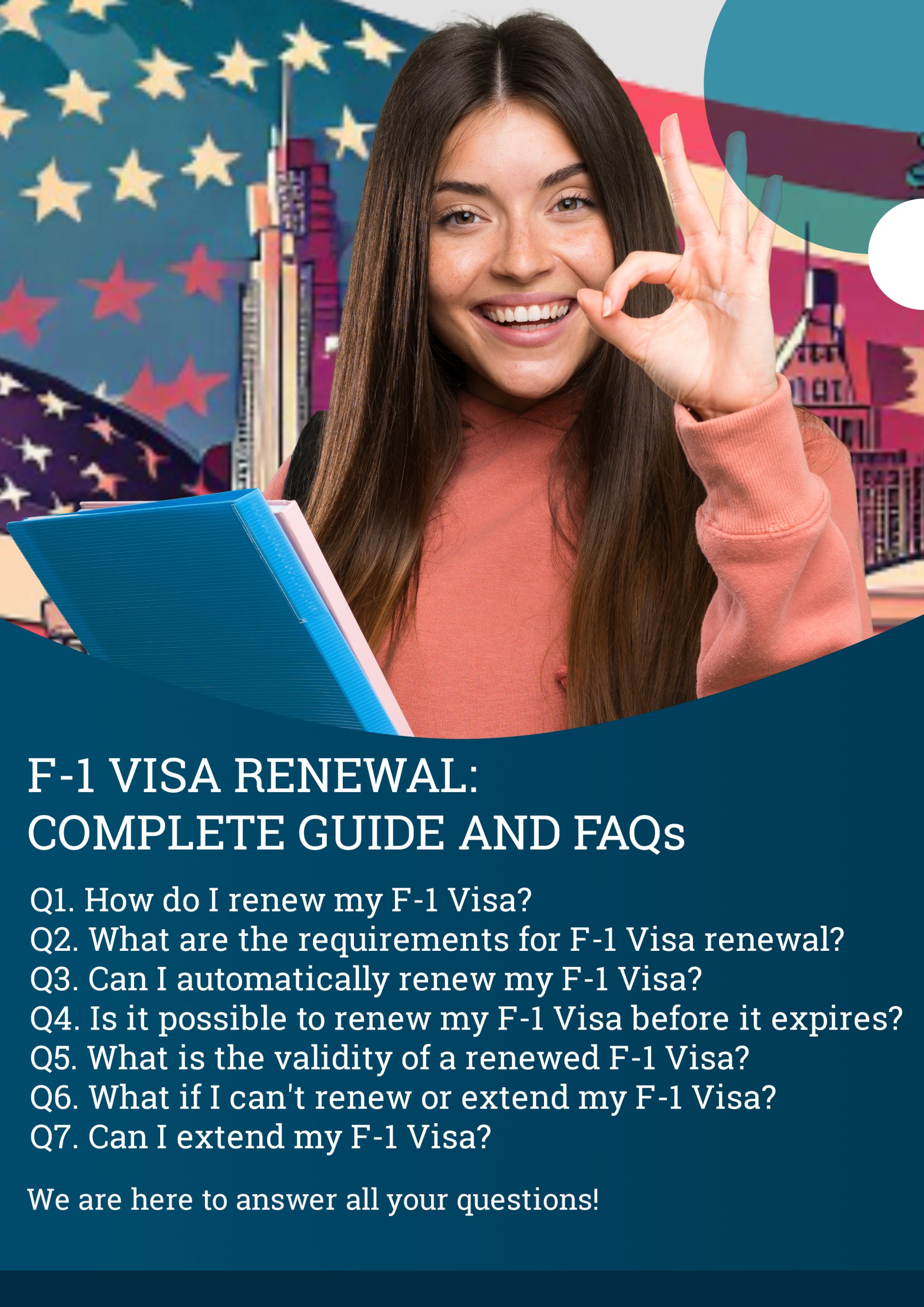As an international student in the United States, holding an F-1 student visa is essential for your academic journey. The F-1 visa enables a student to reside temporarily within the United States for a specified duration to pursue studies at a school, college, seminary, or conservatory. There may come a time when you need to renew this visa, especially if it expires before your study program concludes. Renewal of your F-1 visa is a process you’ll typically undertake from your home country, or another country, by applying at a U.S. embassy or consulate. It’s generally recommended to apply from your own country.
When is Visa Renewal Necessary?
Renewing your F-1 visa is necessary if you intend to travel outside the U.S. and return to continue your studies. Although your student visa expiration does not affect your ability to continue your studies in the U.S. as long as your Form I-20 is valid, being prepared for unforeseen travel is wise. Note that F-1 students, barring Canadian citizens, must have a valid and unexpired F-1 entry visa to enter the U.S. in F-1 status.
Maintaining Legal Status in the U.S.
Even if your F-1 visa expires while you’re in the U.S., you can remain legally as long as your I-20 form is active, your I-94 card is marked ‘F-1, D/S’, and you’re making progress towards your degree. But, ensure your visa and entry allowances are current before any international travel.
Travel and Visa Considerations
For short trips (up to 30 days) to Canada, Mexico, or the Caribbean (Cuba excluded), an unexpired F-1 visa might not be necessary for re-entry into the U.S.
Securing a New F-1 Visa
To acquire a new F-1 visa, you cannot do so within the U.S.; it must be done at a U.S. consulate outside the country. Be prepared with:
– A valid Form I-20 with a recent travel signature.
– Previous I-20s.
– A passport valid for at least six months into the future.
– Recent financial evidence proving your ability to finance your studies.
– Receipt of your I-901 SEVIS fee payment.
– Academic transcripts or attendance proofs.
– The necessary visa application form, fees, and photographs.
Planning and Timing
Visa appointment processes and waiting times can vary. It’s generally advised to renew your visa in your home country. If considering renewal in a third country, verify your eligibility and the specific consulate’s policies, especially during peak periods.
Third Country Visa Application Considerations
Renewing your U.S. visa in a third country, meaning a country other than your own citizenship or legal permanent residence, isn’t always feasible. Some U.S. consulates may not accept visa applications from “third country nationals” during peak periods. For instance, the U.S. Embassy in Paris might not process applications from individuals who aren’t French citizens during the summer months. If considering applying in a third country, ensure your eligibility by directly contacting the respective U.S. Embassy or Consulate.
Additionally, if you apply for a U.S. visa in Canada or Mexico and your application gets denied, re-entry to the U.S. won’t be permitted. In case of visa denial, you’ll be required to return to your home country for visa renewal. It’s advisable to discuss any plans regarding visa applications in countries other than your own with an International Student Advisor at the OISS (Office of International Student Services).
Understanding the I-901 SEVIS Fee
The U.S. Department of Homeland Security implemented the I-901 SEVIS fee in September 2004. Currently set at $350 for F-1 students, the fee may or may not apply depending on certain conditions:
1. F-1 students who entered the U.S. on an I-20 issued before September 1, 2004, are exempt from the fee if they’ve maintained continuous lawful F-1 status since their initial entry. Documentation of previous I-20(s) is necessary to demonstrate eligibility.
2. F-1 students who entered the U.S. after September 1, 2004, and have already paid the fee, do not need to pay it again unless issued a new Form I-20 for initial entry. Providing a copy of the original I-901 SEVIS fee payment receipt suffices.
3. F-1 students applying for an F-1 visa after a five-month absence or returning to resume their program after a leave absence are obligated to pay the fee.
4. Applicants seeking reinstatement or traveling to regain F-1 status must also pay the fee.
Frequently Asked Questions About F-1 Visa Renewal
Q1. How do I renew my F-1 Visa?
To renew your F-1 visa, you must adhere to the same procedures as when you initially applied:
1. Complete the visa application: Even for renewal, you must fill out the online visa Form DS-160 and print the confirmation page.
2. Schedule an embassy or consulate appointment: Arrange an interview at your local embassy or consulate to expedite the visa process. However, you may qualify for an interview waiver if you meet specific exemption criteria.
3. Gather required documents: Prepare the original documents needed for your initial F-1 student visa application. If necessary, obtain apostille stamps for your documents and translate them.
4. Pay the visa application fee: If payment is required before your interview, ensure timely submission to obtain the fee receipt.
5. Attend the visa interview: Participate in the interview for your F-1 visa renewal. Meeting the initial application requirements increases the likelihood of visa renewal.
After applying for F-1 visa renewal, remain in the country where you applied until your application is processed, refraining from travel to the U.S. In case of renewal denial, returning home is necessary.
While it’s possible to renew your F-1 visa from a country other than your residence, applying from home is advised for a smoother process with the embassy/consulate.
Q2. What are the requirements for F-1 Visa renewal?
You should compile the same documents required for your initial F-1 visa application, along with additional items:
1. Passport validity: Ensure your passport remains valid for at least 6 months beyond your intended departure from the U.S.
2. Visa photograph: Upload your visa photo during the online application process, and retain a physical copy in case of digital upload issues.
3. Application form: Print the confirmation page of Form DS-160.
4. Form I-20: Maintain possession of the Form I-20 provided by your educational institution.
5. University records: Include supplementary documents pertaining to your U.S. study experience:
– Description of your study program
– Details of research activities conducted in the U.S.
– Copies of school transcripts and curriculum vitae (CV)
– Letter confirming your current program enrollment
– Evidence of paid visa fees
– Documentation outlining the funding for your study program
– Verification of no involvement in criminal activities during your U.S. stay
– Assurance of intent to return to your home country.
Q3. Can I automatically renew my F-1 Visa?
Yes, through automatic visa renewal. This involves traveling to Canada, Mexico, or another U.S. territory for less than 30 days. Ensure you check visa requirements for the country you plan to visit. Upon re-entry to the U.S., your F-1 visa may be automatically renewed.
Q4. Is it possible to renew my F-1 Visa before it expires?
Yes, you can renew your F-1 Visa before its expiration if you need to re-enter the U.S. Typically, you wait for the visa to expire before renewing.
Q5. What is the validity of a renewed F-1 Visa?
A renewed F-1 Visa usually lasts for another year. If your studies extend beyond this, you may apply for another renewal.
Q6. What if I can’t renew or extend my F-1 Visa?
If you’re unable to renew or extend your F-1 Visa, you have 60 days post your academic program and OPT to leave the U.S. However, you can change your status by:
– Seeking an H-1B visa sponsorship for up to 6 years, potentially leading to a Green Card.
– Self-petitioning for an Employment-Based Green Card if you possess extraordinary abilities.
– Investing in a U.S. enterprise, though this requires a significant financial commitment.
– Marrying a U.S. citizen, which involves stringent proof of a genuine relationship.
Q7. Can I extend my F-1 Visa?
Yes, through post-graduation OPT. This involves working under a U.S. employer for 12 months after your studies, potentially leading to an H-1B visa sponsorship. STEM students can extend their OPT for up to 24 months.
Note: Always ensure that you stay updated with the latest immigration policies as they can change.
We are glad we could help! With this handy guide and a sprinkle of determination, you’re well on your way to securing your US student visa and unlocking a world of academic possibilities. So pack your bags, grab your textbooks, and get ready to chase your American dream – the visa gateway is open! We at KnowMySlots are the OneStopDestination for all visa related services!
For more insights, strategies, and guidance, bookmark our blog, and join our community of global education enthusiasts. Together, let’s turn your international education dreams into reality!
——————————————————————————————————————————-
Read more on
https://travel.state.gov/content/travel/en/us-visas/study/student-visa.html
https://international.iupui.edu/visas/f1-students/apply/visa-renewal.html
https://visaguide.world/us-visa/nonimmigrant/study-exchange-visas/f1/renewal/#google_vignette

